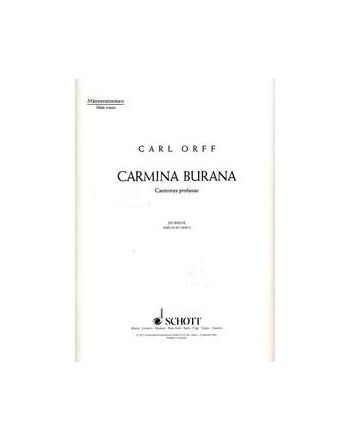Carmina Burana
Détails du produit
Description
SYNOPSIS
Carmina Burana commences with a passionate outcry of lamentation addressed to Fortuna, the goddess of fortune. How can she reign so blindly over the world! The mercurial goddess strikes wounds indiscriminately and distributes her favours equally randomly; whoever is on top today, can be already on the way down tomorrow! All the more reason to enjoy the joys of life to the full while you can! The motto of the day is “Carpe diem“!
The worshippers of the sun therefore swarm out to enjoy nature in the spring: they adorn themselves, dance, court each other and descend into a state of wild youthful exhilaration.
The gamblers prefer to convene in the tavern where they loudly exchange coarse remarks and vulgar jokes, stuff their paunches with good food and their heads with alcohol and play furious games of dice and cards.
The high society in contrast have a more elegant approach: they stroll along exquisite paths of love, philandering and sighing, flirting and bitching, scaring and tempting. And once every Jack has found his Jill, they immediately disappear into their little chambers!
In conclusion: enjoy all the thousandfold pleasures of life without restraint, as who knows when Fortuna will strike again and once more wilfully withdraw her favours!
COMMENTARY
On Maundy Thursday 1934, Orff received a book which he had previously seen listed in an antiquarian book catalogue and immediately ordered: Carmina Burana. Lateinische Lieder und Gedichte einer Handschrift des XIII. Jahrhunderts aus Benediktbeuern. Herausgegeben von J. A. Schmeller. [Carmina Burana: Latin songs and poetry from a manuscript dating from the XIII century from Benediktbeuern, edited by J. A. Schmeller]. On opening the book, the first thing Orff encountered was an illustration of Fortuna, the goddess of fortune, and the lines O Fortuna / velut luna / statu variabilis. The composer was so fascinated by these verses that he immediately set them to music the very same day, producing the choral movement which would become the opening section of Carmina Burana and the most famous of Orff’s compositions: O Fortuna. It was however not only these few verses which initially fired Orff’s imagination. His creativity was unleashed by many other songs; he compiled his first concept of the work with vocal and dance numbers in a state of frenzy and only three days later had already written down several choral movements. Orff however encountered problems with the medieval codex and enlisted the aid of Michel Hofmann, the head of the Bamberg Archive Council. With his help, it was possible to sort through the plethora of text material, select suitable texts and create dramatic-dramaturgic structures. During the compositional process however, Orff did not permit himself to be influenced by the neumes which accompanied some of the poems, but focused entirely on the rousing rhythms and visual impact of the poems and their richly-vowelled timbre and linguistic trenchancy.
While work on the concept and composition of the scenic cantata was swiftly concluded, Orff did not actually complete the fair copy of the score until August 1936. It subsequently took a further ten years for the work to embark on its journey around the world; the international triumph of Carmina Burana only began in the years following 1945. Orff was nevertheless already certain of the significance of this scenic cantata for his artistic development right from the start: the very day after the work’s first performance, he wrote to his publisher Carmina Burana forms the beginning of my collected works.
Orchestral Cast
Contenu
Fortuna Imperatrix Mundi: 1. O Fortuna - 2. Fortune plango vulnera -
I Primo Vere: 3. Veris leta facies
4. Omnia sol temperat
5. Ecce gratum -
Uf dem Anger: 6. Tanz
7. Floret silva
8. Chramer, gip die varwe mir - 9. Reie: Swaz hie gat umbe
Chume, chum geselle min
Swaz hie gat umbe
10. Were diu werlt alle min -
II In Taberna: 11. Estuans interius
12. Olim lacus colueram
13. Ego sum abbas
14. In taberna quando sumus -
III Cour d’Amour: 15. Amor volat undique
16. Dies, nox et omnia
17. Stetit puella
18. Circa mea pectora
19. Si puer cum puellula
20. Veni, veni, venias
21. In trutina
22. Tempus est iocundum
23. Dulcissime -
Blanziflor et Helena: 24. Ave formosissima -
Fortuna Imperatrix Mundi: 25. O Fortuna
Plus d'infos
Oper
Musikalische Leitung: Bertil Wetzelsberger
Inszenierung: Oskar Wälterlin · Kostüme: Ludwig Sievert · Bühnenbild: Ludwig Sievert
(scenic) (scenic performance)





